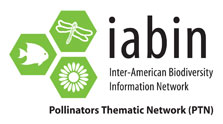 |
By facilitating information access and exchange, the IABIN PTN will support successful monitoring and management of pollinator populations throughout the western hemisphere. |
Partners & Grantees Consortium Members The IABIN PTN is coordinated by a consortium of organizations from throughout the western hemisphere, which is lead by the Pollinator Partnership . The Pollinator Partnership (P2)
|
Organization / Coordinator |
Country |
Amount |
Period |
Purpose |
Argentina |
10,000 |
In Negotiation |
Digitize 20,000 specimens of pollinators and related plants in the Province of Misiones, Argentina. |
|
Brazil |
15,000 |
31-Jul-2008 to 1-Abr-2010 |
Digitize information on bees and flowers. |
|
Brazil |
10,000 |
In Negotiation |
Digitize 4.000 specimens of the insect visitors’ and pollinators’ specimens of the CPATU Entomological Museum, as well as the plants they use as food resources. |
|
Brazil |
9,924 |
In Negotiation |
Digitize 64,500 pollinator specimens deposited in the Entomological Collection Father Jesus S. Moure |
|
Brazil |
9,940 |
6-Ago-2009 to 1-Jun-2010 |
Digitize 15,061 specimens of bees plus their associated plants that belong to the LEACOL bee collection. |
|
Chile |
10,000 |
13-Sep-2009 to 1-Jun-2010 |
Digitize 230 species and approximately 60.000 individual specimens of bees in Chile. |
|
Chile |
10,306 |
18-Nov-2009 to 1-Jun-2010 |
Digitize 7,000 to 10,000 specimens that belong to approximately 3,000 species of Diptera, Coleoptera, Himenoptera, Lepidoptera and birds that can be pollinators or potencial pollinators in Chile. |
|
Colombia |
10,000 |
Completed |
Digitize the information of 13.000 specimens of bees and pollinator bats deposited in the Natural Sciences Institute (ICN) and in the Bees' Laboratory of the Biology Department (LABUN). |
|
Fundación para la Conservación y Educación Biológica – BioCe |
Ecuador |
10,000 |
14-Oct-2009 to 1-Jun-2010 |
To implement, update and maintain for a minimum of five years an Internet-based data base with 30,000 specimens of families of Lepidoptera pollinators, including digital images of superior and inferior parts. |
Guatemala |
10,000 |
24-Ago-2009 to 24-Jun-2010 |
To digitalize and make available to general public 7,934 records of pollinating bees and their food plant. |
|
Mexico |
2,948 |
29-Jan-2010 - 1-Jun-2010 |
Digitize 4000 specimens of bees currently deposited at the Laboratory of entomology, Universidad de las Américas Puebla, Mexico |
|
Panama |
15,000 |
27-Jul-2009 to 27-Jun-2010 |
To digitalize 60,000 specimens of tropical bees from the Dr. David W. Roubik, Ph.D. collection |
|
Paraguay |
10,000 |
23-Jul-2009 to 23-Jul-2010 |
Digitize 4089 records with 664 insects species, 18 hummingbirds' species and 12 bats' species know nowadays in Paraguay. |
|
Peru |
10,000 |
Completed |
Digitize quality data including scientific information about Peru's insects, mammals and pollinating birds. |